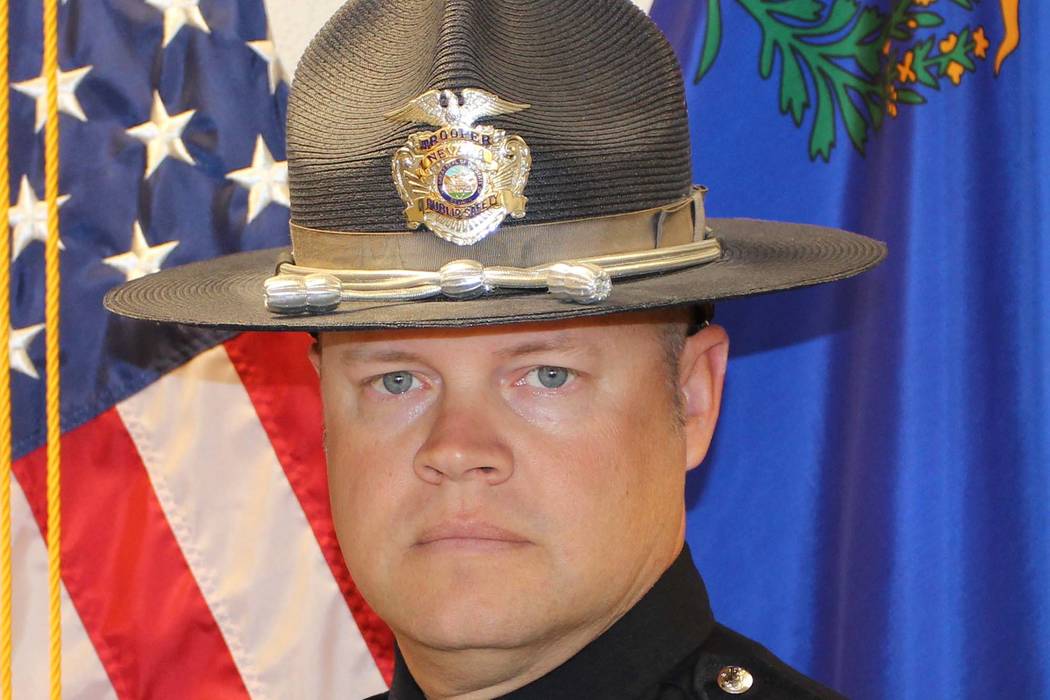Nevada trooper saves man’s life with anti-overdose drug
In 25 years working in law enforcement, Wayne Dice said, he’s never used a stun gun, pepper spray or bullets — all common tools of the trade. But last week, the Nevada Highway Patrol sergeant used a new tool to save a life: a nasal spray with an opioid-overdose reversal drug.
“I was at the right place at the right time,” Dice said Wednesday.
The Highway Patrol announced in June that it would equip officers who elect to train with the drug, naloxone. Dice volunteered.
On Sept. 17, Dice had just finished working a traffic stop south of Searchlight and was driving toward Laughlin when he saw a bus on the side of U.S. Highway 95 about 7:20 p.m. The bus driver waved him down and said a man in the bus was having a heart attack.
When Dice got on the bus, a passenger was performing CPR on an unconscious man.
“I didn’t know what I had at the time,” Dice said. “I didn’t know it was a drug overdose.”
Footage from Dice’s body camera captured encounter. The footage showed Dice trying to wake the man.
“Stay with me, that’s it you’re breathing, stay with me bud,” Dice told the unconscious man while performing sternum rubs, a move used by first responders to elicit a response from patients by strongly pressing on their chest.
Then Dice began to notice the signs: The man’s skin was cold and clammy, and his pupils were pinpoint small. He still wasn’t breathing.
“I pretty much knew at that point it was an overdose,” Dice said. “He was basically, at that point, almost dead.”
Dice and another passenger carried the man outside and lay him on a blanket. A volunteer firefighter from Cal-Nev-Ari and an off-duty firefighter from Laughlin stopped to help, but no medical personnel had arrived.
One of the two men helping Dice can be heard saying he doesn’t “have that equipment on me.”
“I got some Narcan if we need to use it,” Dice said, referring to a brand name for naloxone. The he ran to get it.
A crying woman said she didn’t know if the man had taken drugs. One of the men helping told Dice to use the naloxone because he was “not familiar with that, but it can’t hurt him.”
Dice used the spray on the man and performed CPR. When medical personnel arrived, Dice sad, the man started breathing again. The footage showed Dice make a call over his radio that “the subject just came to.”
“I could see him breathing better,” Dice said. “After about five to seven minutes he actually opened his eyes. It was just a complete reversal of this overdose.”
He said he didn’t know what drugs the man had taken.
Naloxone restores normal respiratory function to someone whose breathing slowed or stopped due to a heroin or prescription-opioid overdose, according to the National Institute on Drug Abuse. Naloxone can be used up to an hour and a half after a person has overdosed, the Highway Patrol said in June.
When the man was taken to a Henderson hospital for further treatment, Dice followed and brought the man’s fiancee along.
Once at the hospital, the difference in the man’s condition was “night and day,” Dice said.
“He thanked me several times,” Dice said. “He couldn’t believe what I had done.”
Dice said the nasal spray was simple to use, and his training consisted mostly of watching a video on the signs of drug overdoses.
“In the end I could teach somebody to use that in five seconds,” he said.
In an emailed statement Wednesday, Highway Patrol spokesman Travis Smaka said Dice’s “quick thinking and professionalism is a glowing example of Nevada Highway Patrol’s commitment to saving lives and serving our community.”
Access to naloxone is important in rural areas like Searchlight and Laughlin because response times for medical personnel are slower, said Dice, who just became a sergeant in Laughlin.
“Being in a rural area, as a trooper I want to have as many tools as I can,” he said. “We don’t have the access to medical as they would in Henderson or Las Vegas or North Las Vegas.”
There were 12.8 opioid overdose deaths per 100,000 Nevadans in 2016, according to state data. In 2011, there were 16.5 opioid overdose deaths per 100,000 Nevadans.
Contact Katelyn Newberg at knewberg@reviewjournal.com or 702-383-0240. Follow @k_newberg on Twitter.























